Clinical documentation is a necessary part of every healthcare practice, but it often feels like the biggest obstacle between clinicians and their patients. Whether it’s writing progress notes, updating treatment plans, or meeting payer and compliance requirements, the administrative burden can leave professionals drained and disconnected.
For many providers, the reality is spending evenings and weekends typing up clinical notes instead of focusing on patient care. This not only reduces the quality of life for clinicians, but also affects their ability to stay fully present during in person sessions.
That’s why AI for clinical notes has become one of the fastest-growing solutions in healthcare. With AI medical scribe tools and AI-powered note taking, clinicians can significantly reduce documentation burden, improve note quality, and give more attention to clients.
In this guide, we’ll break down the top 7 AI clinical notes tools in 2025, compare them side by side, and help you decide which one fits your workflow, budget, and compliance needs best.
Why Mental Health Professionals Are Looking for AI Clinical Notes Tools
Clinical documentation isn’t optional, but it’s eating into the very thing clinicians care about most: patient care. For many mental health professionals, evenings are spent typing progress notes instead of resting, and in-session focus often slips because they’re mentally tracking what needs to be documented later.
The result? Burnout, less time for patients, and a constant feeling of playing catch-up.
AI clinical note tools flip this equation. Automating routine documentation gives therapists and counselors back hours each week, helps them stay present with clients, and ensures that compliance and payer requirements don’t come at the cost of their mental well-being.
Top 7 AI Clinical Notes Tools
To help you cut through the noise, we’ve rounded up seven AI-powered note-taking tools making life easier for clinicians in 2025. Each one tackles documentation pain points differently—so you can find the right fit for your practice, workflow, and budget.
1. Supanote
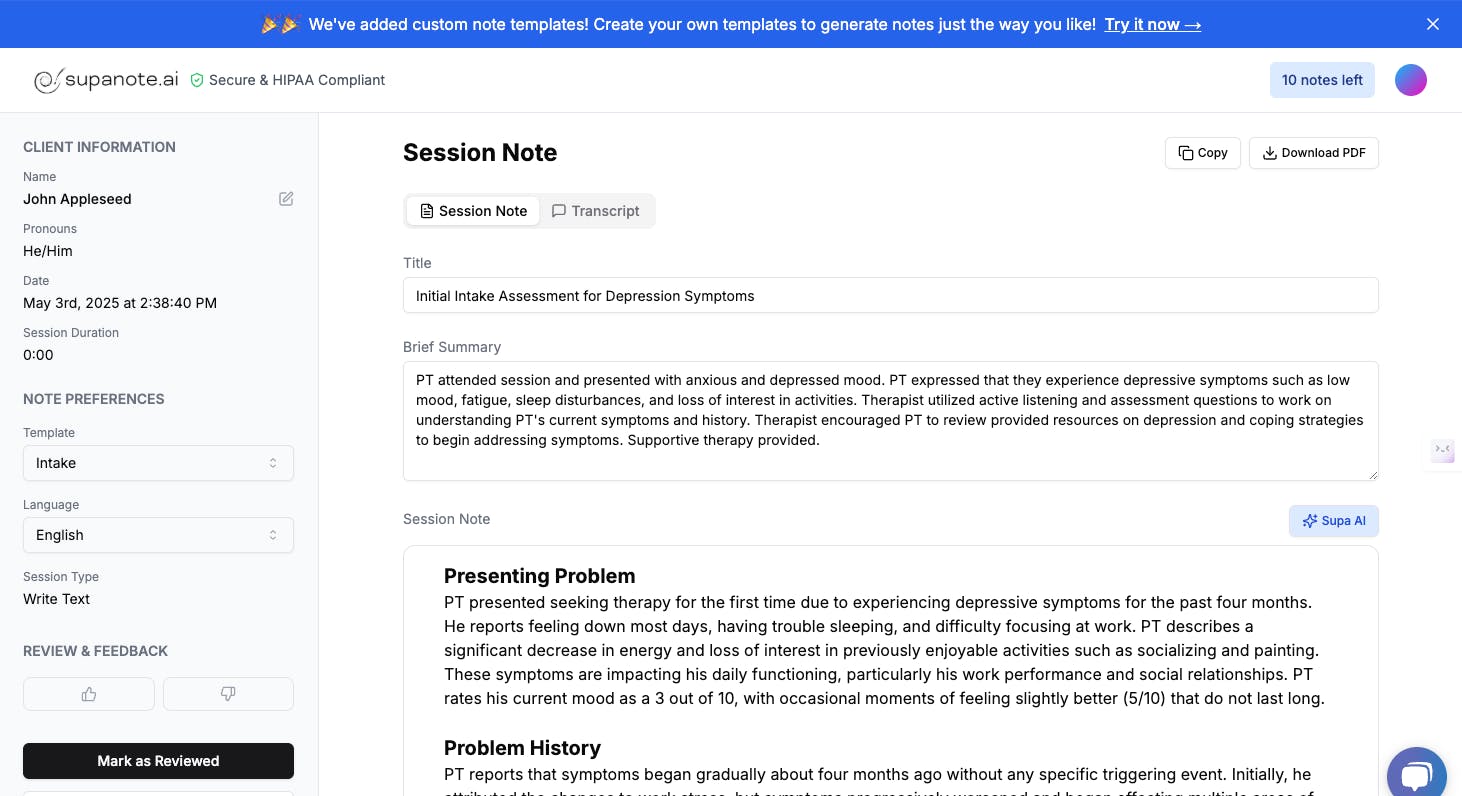
Supanote stands out as the only AI note-taking tool built specifically for mental health with true native EHR integration. Its Super Fill button automatically populates your EHR with one click, eliminating the copy-paste workflow that slows down other platforms.
Features:
- Native EHR Autofill – Direct integration with SimplePractice, Valant, and TherapyNotes via the Super Fill button
- Mental Health Specialization – Purpose-built for therapy sessions with deep understanding of clinical documentation and treatment planning
- Deep Personalization – Learns your unique documentation style and client-specific language over time
- Superior Human Support – Fast, responsive customer service with real people behind every interaction
- Comprehensive Note Types – Covers progress notes, treatment plans, intake summaries, and crisis documentation
Pricing (Annual Billing): Starting at $19.99/month for 40 clinical notes, Professional at $39.99/month for 100 notes, Premium at $69.99/month for unlimited notes
Best For: Solo and group therapy practices needing affordable, therapy-focused AI documentation that reduces administrative burden.
2. Freed
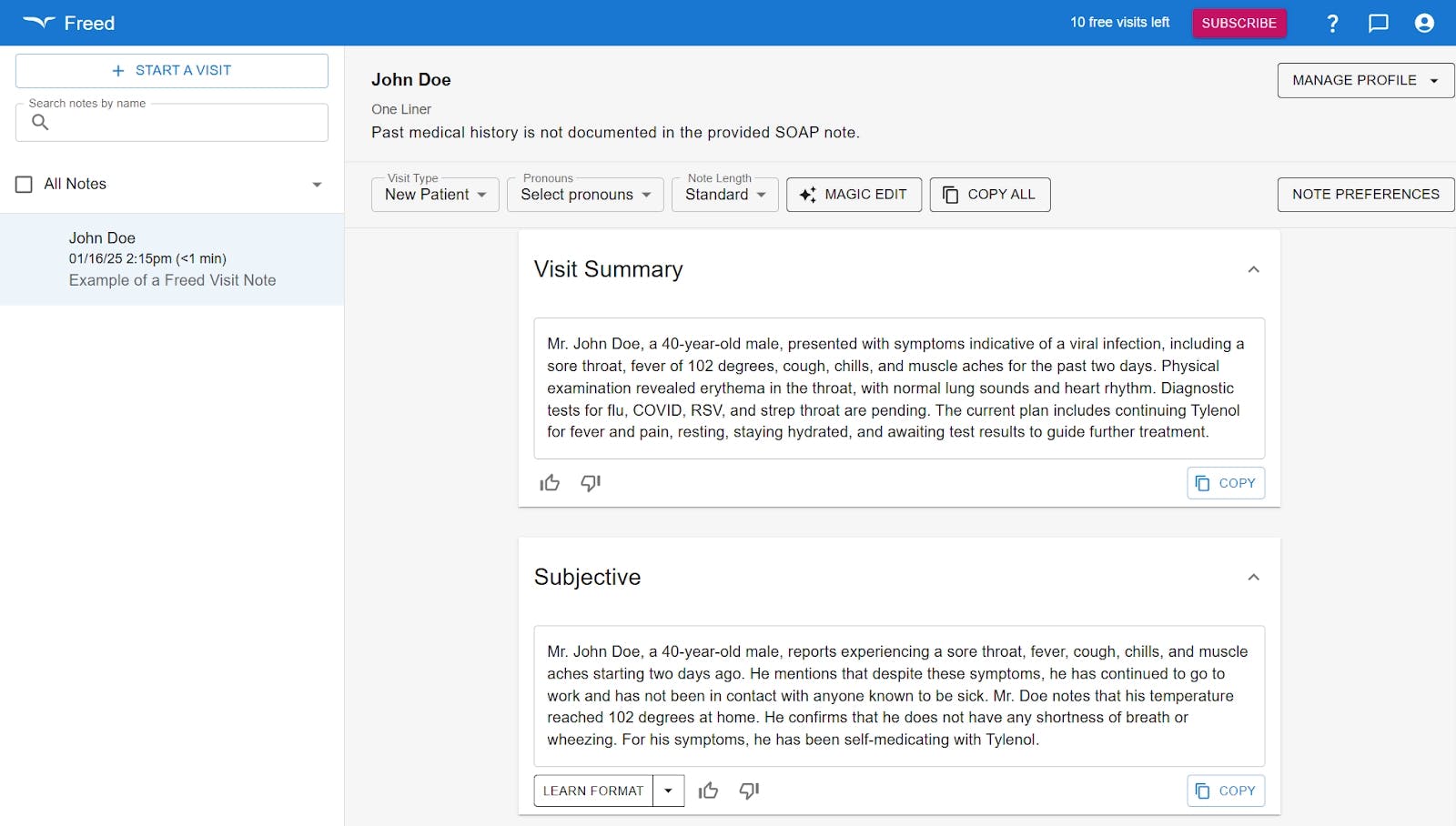
Freed is an AI-powered medical scribe built by a physician to help providers spend more time with patients and less time typing notes.
Features:
- Ambient scribe captures conversations in real time
- Learns medical terminology and context over time
- HIPAA-compliant with strong security
- Reduces administrative burden for busy providers
Pricing: Starts at $90/month for solo clinicians, $84/month per clinician for 2–9 users (billed annually), with custom pricing for 10+ users. 7-day free trial available, no credit card required.
Best For: High-volume clinicians and hospitals that want an accurate AI medical scribe to handle extensive documentation.
3. Heidi Health
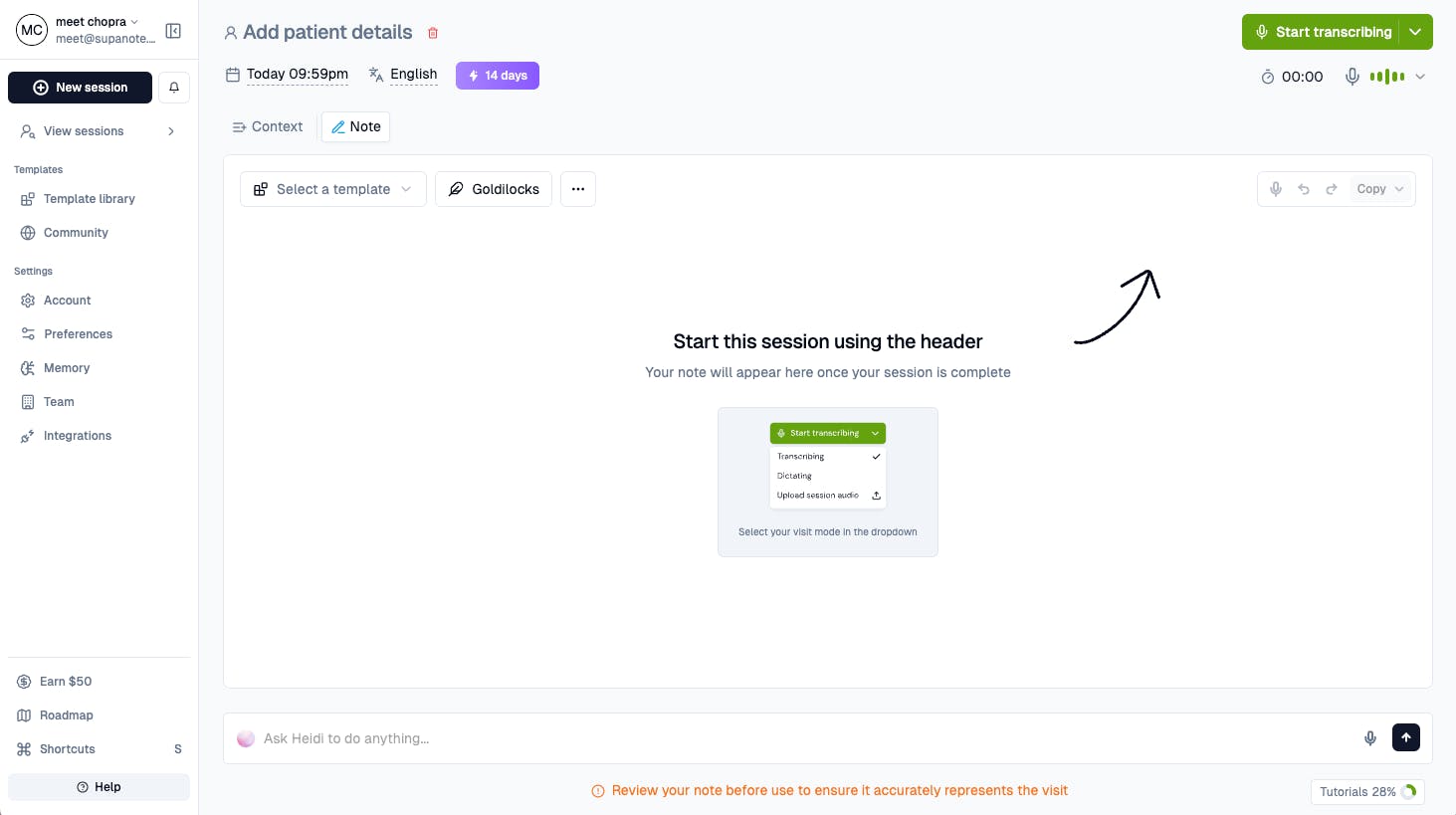
Heidi Health is a fast-scaling AI for clinical notes solution used across international healthcare systems. It combines automation with compliance to support new teams and large practices.
Features:
- Customizable templates for SOAP and progress notes
- AI memory model that adapts to your style of documentation
- HIPAA and GDPR compliant for global data privacy
- Scalable workflow tools for teams
Pricing: Free plan available; Pro at $799/year per user, Together at $1,199/year per user (both billed annually), with custom pricing for Enterprise plans and a 14-day free trial for paid tiers.
Best For: Large clinics and health systems seeking AI-powered note taking for multiple specialties and new teams.
4. DeepScribe
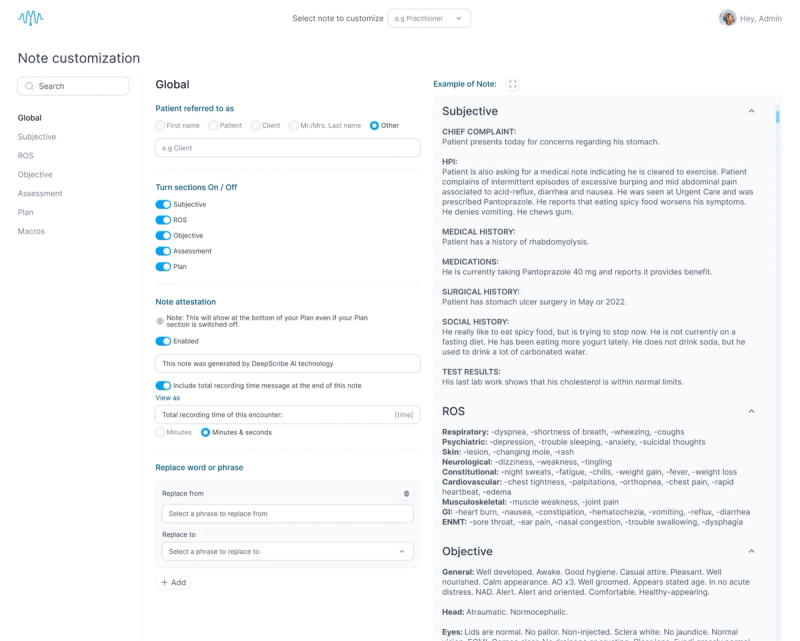
DeepScribe is one of the most established AI medical scribe platforms, built to integrate directly into EHR systems and improve note quality.
Features:
- Context-aware AI features that adapt to specialty
- Seamless EHR integration for real-time documentation
- Helps meet payer and compliance requirements
Pricing: Typically $400–$500/month per provider, depending on setup and integrations.
Best For: Mid-to-large practices or enterprise clinicians who need accurate, specialty-driven documentation and robust EHR integration.
5. AutoNotes
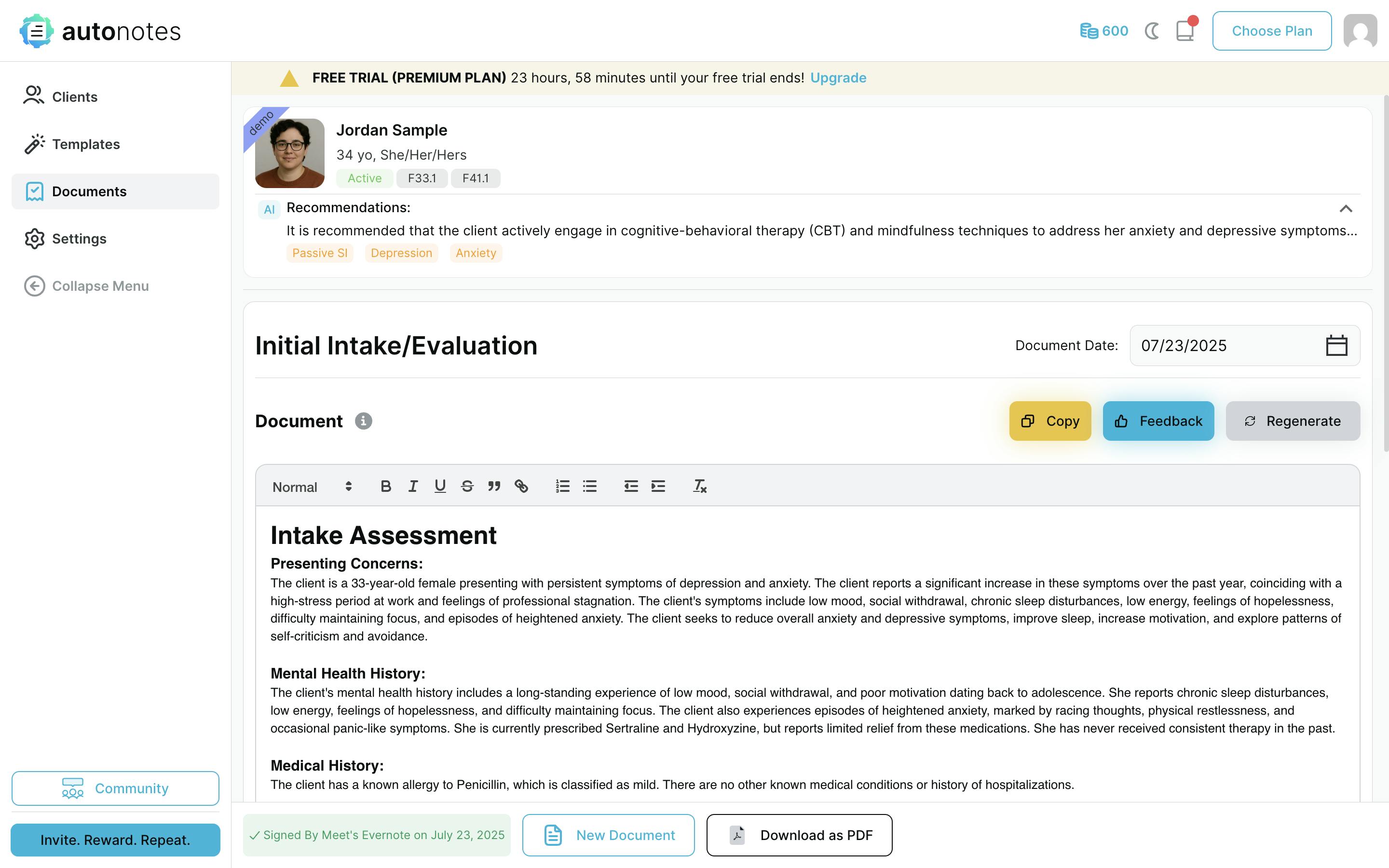
AutoNotes is designed for speed, helping clinicians quickly create SOAP, DAP, and progress notes without spending hours on admin.
Features:
- Generates treatment plans and notes in seconds
- Library of customizable templates
- Affordable and simple app interface
- Works for in person sessions
Pricing: Essential at $250/year, Premium at $499/year, Ultimate at $999/year, with custom pricing for Group Practice plans and a free trial available.
Best For: Solo therapists or small practices that want speed and affordability, but compliance-conscious providers should note it does not provide BAAs.
6. Clinically AI
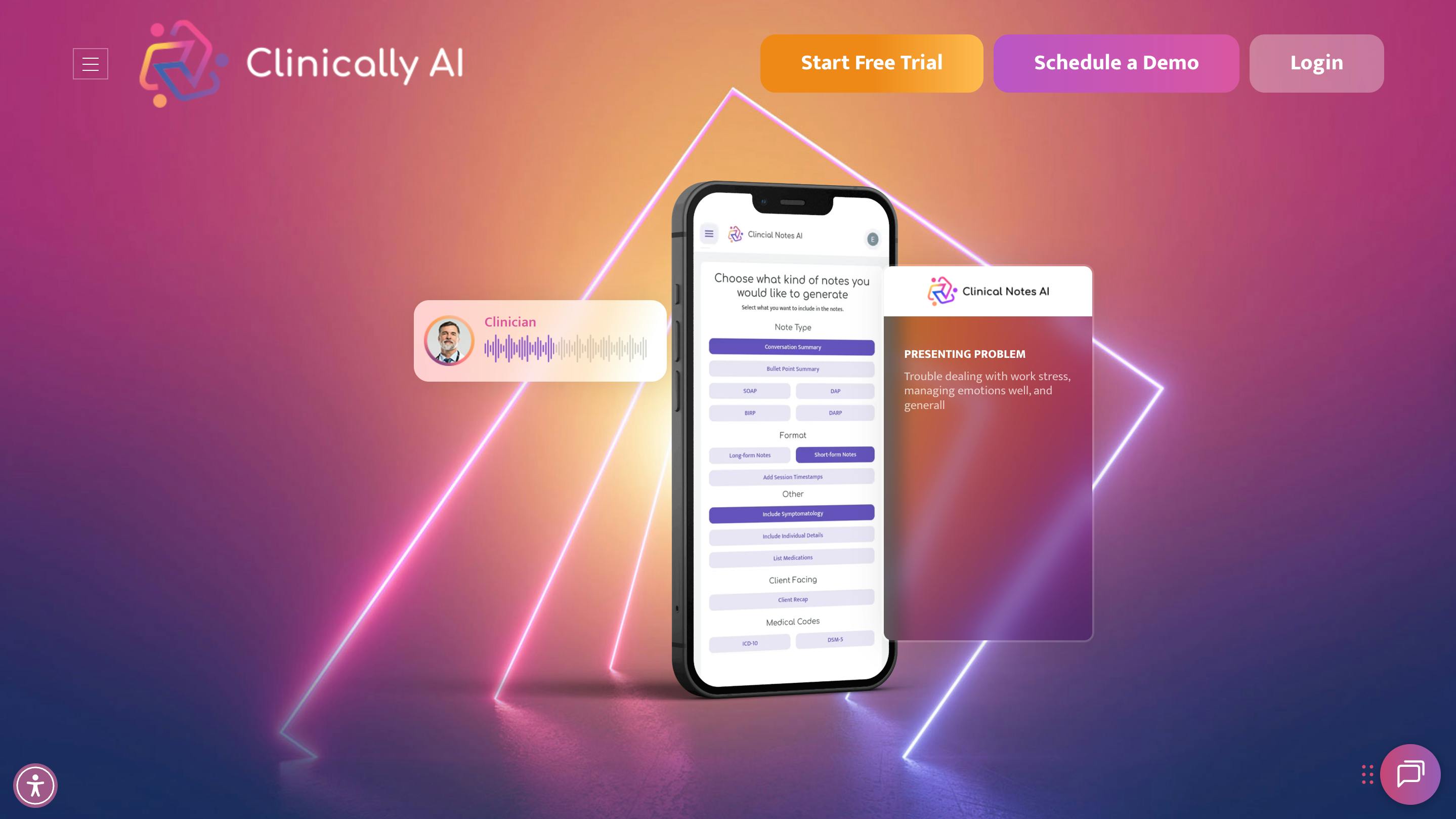
Clinically AI is built for behavioral health, focusing on treatment plans and documentation that support clients while maintaining data privacy.
Features:
- HIPAA-compliant with SOC 2 certification
- Behavioral health-focused templates
- Real-time charting during sessions
- Built to reduce administrative burden
Pricing: Dictation at $180/year, Plus at $360/year, Pro at $600/year, with custom pricing for Enterprise plans and a 14-day free trial available.
Best For: Behavioral health clinicians and therapists needing a secure, niche-focused tool for treatment plans and progress notes.
7. Abridge
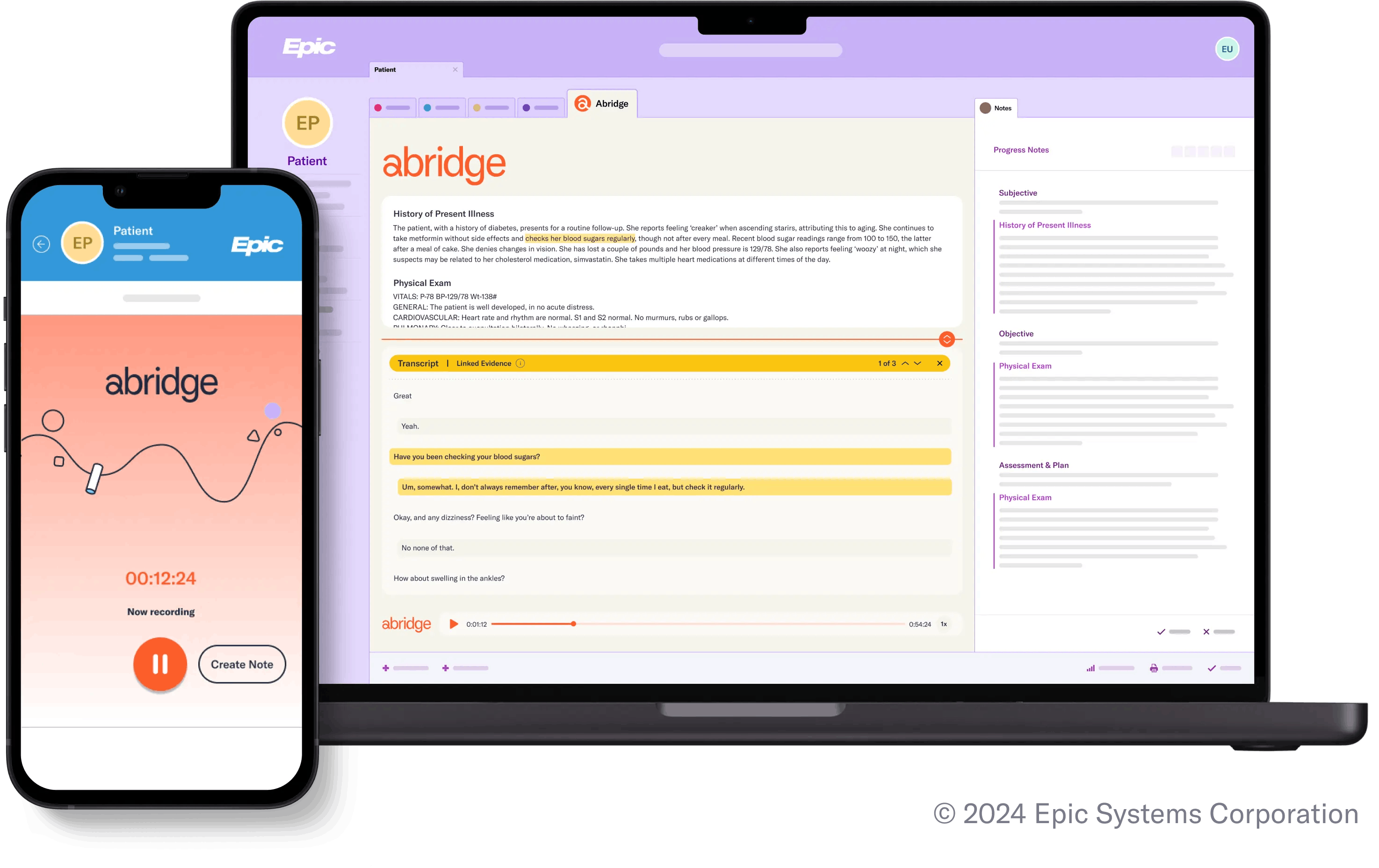
Abridge is an enterprise-focused AI medical scribe used by hospitals and large health systems to improve note quality across specialties.
Features:
- Ambient AI features for real-time recording
- Strong compliance with HIPAA and enterprise security
- Specialty templates for a wide range of documentation
- Built for integration into hospital workflow
Pricing: Starts around $250/month per provider, with enterprise packages for health systems.
Best For: Enterprise healthcare organizations that want AI-powered note taking at scale to reduce documentation burden.
AI Clinical Notes Alternatives Comparison Table
This section gives you a quick side-by-side look at each tool, so you can easily compare features, compliance, and pricing.
Tool | Starting Price | Best For | HIPAA-Compliant | Templates | EHR Integration |
|---|---|---|---|---|---|
Supanote | $19.99/mo | Solo & group therapy practices | Yes | SOAP, DAP, EMDR | Native autofill |
Freed | $99+/mo | High-volume practices | Yes | SOAP, specialty notes | Yes |
Heidi Health | $39–99/mo | Larger teams, scaling clinics | Yes | Customizable | Yes |
DeepScribe | $400–500/mo | Enterprise clinics | Yes | Customizable | Yes |
AutoNotes | Free–$39/mo | Solo therapists | No BAA | SOAP, DAP | Limited |
Clinically AI | Custom pricing | Behavioral health | Yes | Behavioral templates | Limited |
Abridge | $250+/mo | Enterprise health systems | Yes | Specialty templates | Yes |
Quick Comparison Overview
This section gives you a bird’s-eye view of which AI tools fit different practice needs.
- Supanote → Best balance of affordability, therapy specialization, and HIPAA compliance
- Freed → Ideal for clinicians needing real-time scribing in busy settings
- Heidi Health → Great for scaling new teams in large healthcare groups
- DeepScribe → Enterprise-grade medical scribe with high note quality
- AutoNotes → Fast and affordable, but limited data privacy
- Clinically AI → Niche behavioral health focus
- Abridge → Built for enterprise health systems managing large volumes of documentation
Key Factors to Consider When Choosing
Here’s what you should keep in mind before selecting an AI medical scribe or AI for clinical notes solution.
- Compliance & Data Privacy: Choose a HIPAA-compliant tool with a BAA for important information.
- Practice Fit: Ensure it supports treatment plans, in-person sessions, and therapy workflow.
- Features & Ease of Use: Look for AI features like real-time summarization, customizable templates, and strong support.
- Pricing vs. Volume: Solo clinicians may prefer affordable monthly unlimited notes, while health systems need scalable pricing.
- User Experience: The right app should help you create accurate notes and spend less time on admin tasks.
Making Your Decision
This section wraps up the comparison and guides you toward the right choice.
- Supanote → Best overall for therapy-focused clinicians
- Freed & DeepScribe → Strong for enterprise-scale documentation
- Heidi Health & Abridge → Excellent for health systems and new teams
- AutoNotes & Clinically AI → Useful for speed or niche focus, but limited in compliance
If you want real results, more mental space, and to stay fully present with clients, Supanote is the gold standard.
Frequently Asked Questions
Q: Which AI for clinical notes tool is best for mental health professionals?
A: Supanote is built specifically for mental health professionals, offering HIPAA-compliant documentation, customizable treatment plans, and templates designed for therapy practices.
Q: Do AI medical scribes work for in-person sessions as well as telehealth?
A: Yes, most leading tools — including Supanote, Freed, and Abridge — support both telehealth and in person sessions, allowing clinicians to stay fully present with their patients.
Q: How do these tools help reduce documentation burden?
A: By automating clinical notes creation, these tools significantly cut down the time spent on typing, letting providers save time, reduce administrative burden, and focus on patient care.
Q: Are these tools HIPAA compliant?
A: Supanote, Freed, Heidi Health, DeepScribe, Clinically AI, and Abridge are HIPAA compliant. AutoNotes does not sign BAAs, so it should not be used with PHI if you want to stay fully compliant.
Q: Can these apps integrate with my EHR system?
A: Yes, Supanote, Freed, DeepScribe, Heidi Health, and Abridge all integrate with major EHR systems. AutoNotes and Clinically AI offer limited or no direct EHR support.
Q: Do I need a credit card to start a free trial?
A: Supanote allows you to sign up for a free trial with no credit card required, making it easy to review and test the features before committing.
Q: How do AI medical scribes handle data privacy and security?
A: Supanote, DeepScribe, Heidi Health, Clinically AI, and Abridge all have strict data privacy policies, encryption, and enterprise-grade security. Always confirm whether a provider offers a BAA before storing PHI.
Q: Can AI-powered note-taking help with treatment plans?
A: Yes. Supanote, Clinically AI, and AutoNotes include specialized templates for treatment plans, helping clinicians create accurate, structured notes that meet payer requirements.
Q: What’s the difference between an AI medical scribe and traditional dictation software?
A: Traditional dictation simply transcribes words. An AI medical scribe like Supanote or Freed uses artificial intelligence to interpret context, apply medical terms, and generate structured clinical documentation.
Q: How much do AI clinical notes tools cost?
A: Supanote starts at $19.99/month, Freed at $99+/month, Heidi Health at $39–99/month, DeepScribe at $400–500/month, AutoNotes from free–$39/month, Clinically AI offers custom pricing, and Abridge starts at $250+/month.
Q: Which tool is best for new teams or scaling practices?
A: Heidi Health and Abridge are excellent for new teams and health systems that need scalable solutions, while Supanote works best for small to medium practices that want a fast, affordable, and compliant option.

